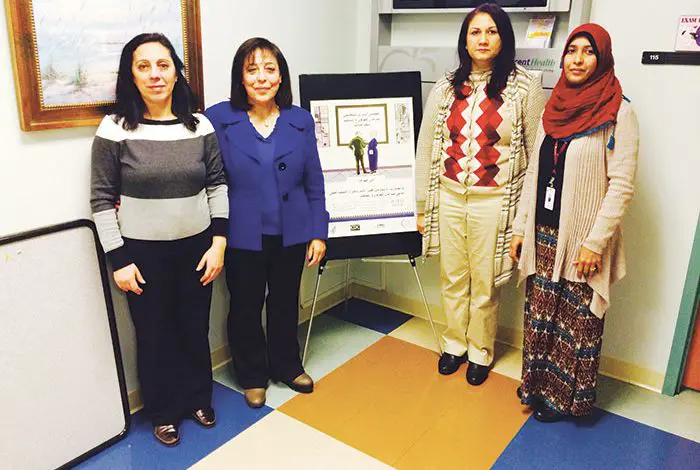
|
| ACCESS associates from the Community Health and Research Center (L-R) Hoda Eldaou, Hiam Hamade, Ghada Aziz and Suhir Abdulghafoor. |
DEARBORN — Hiam Hamade, the supervisor of the ACCESS Chronic Disease Prevention Program, helps organize up to three educational seminars a month on colon cancer prevention.
The seminars, hosted at churches, mosques and community centers, are part of the ACCESS Colorectal Cancer Screening Awareness Campaign.
The program is designed to provide bilingual and culturally appropriate education to low-income Arab American adults with limited knowledge of cancer morbidity and limited access to health care due to lack of insurance. The program aims to increase the number of screenings among adults over age 50 and increase early detection of colorectal cancer.
Hamade, a breast cancer survivor, said she goes out in the community with her group and people know them.
While colon cancer is more commonly associated with men, Arab women with the disease have also turned to the program for help.
Cancer is a silent issue in the Arab community, one most people are afraid to discuss publicly. Even during the seminars, Arab Americans are afraid to ask questions. Instead, they contact Hamade afterwards with concerns.
“Sometimes even before I can get back to the office after a seminar, I get calls from people with questions,” Hamade said. “People are too shy to usually ask there [during the seminars] because of the stigma of cancer in the community. After I give my contact information, they begin reaching out.”
It was only a few decades ago that people in general avoided talking about cancer, often referring to it (if they did at all) as “the big C.”
Hamade said people don’t ask questions during the presentations because they aren’t comfortable enough.
What makes the educational seminars significant is the information they provide on how to detect colon cancer early.
“When people are well educated and informed, they will know when they have a problem,” Hamade said. “But sometimes if they don’t have the education they will not recognize they have a problem with their colon.”
Colon cancer is cancer of the large intestine (colon), the lower part of your digestive system. Rectal cancer is cancer of the last several inches of the colon. Together, they’re often referred to as colorectal cancers. Most cases of colon cancer begin as small, noncancerous (benign) clumps of cells called adenomatous polyps. Over time some of these polyps become cancerous.
Common signs of colon cancer include weight loss or poor appetite; weakness and fatigue; tender abdomen or abdominal pain, either ongoing or with repeated bouts of cramping; indigestion; nausea and blood in the stool.
Screening is crucial because when found early, colon cancer is highly treatable.
Hamade said she referred more than 600 people for colon cancer screenings last year.
While the program provides education and some free screenings, Hamade says ACCESS will still help patients with colon cancer get access to affordable medical procedures if their screenings are positive. She said she has tried to connect patients with physicians and medical centers that will conduct procedures such as a colonoscopy at more affordable rates than the thousands of dollars they often cost.
The program also provides a strong support system for patients .
Hamade said the program has also tried to help patients get insurance if they don’t have it. Patients with the disease are often required to undergo surgery and chemotherapy.
If you’ve been diagnosed with colon cancer, you should get one colonoscopy a year, even if your cancer goes away.
“Sometimes I need to send people to get a colonoscopy and those people don’t have the money for one, Hamade said. “So I have to look for funds or I have to look for donors who will voluntarily do the colonoscopy for free or make it more affordable.”
ACCESS also offers education and assistance to patients with breast, lung, prostate and cervical cancer. According to Hamade, people at ACCESS most commonly get treatment for breast cancer, followed by cervical and colon cancer.
To contact Hiam Hamade, call 313.216.2206. To reach the ACCESS Community Health and Research Center, call 313.216.2200.






Leave a Reply